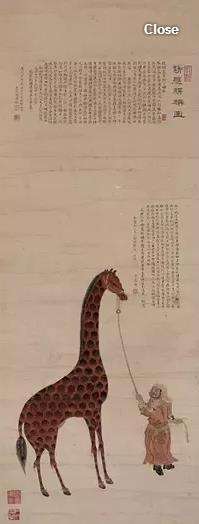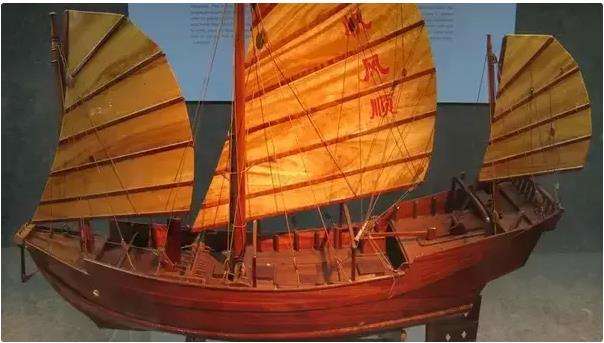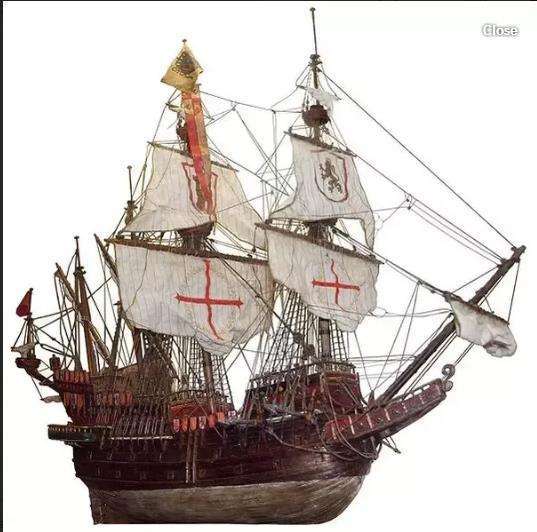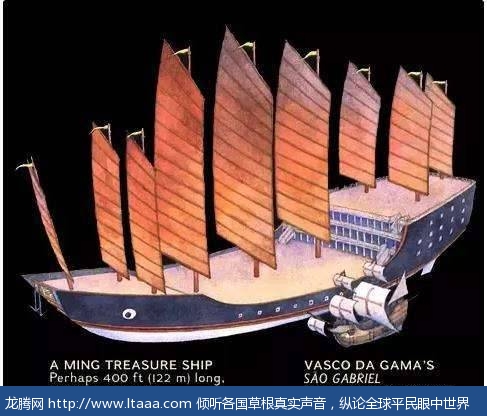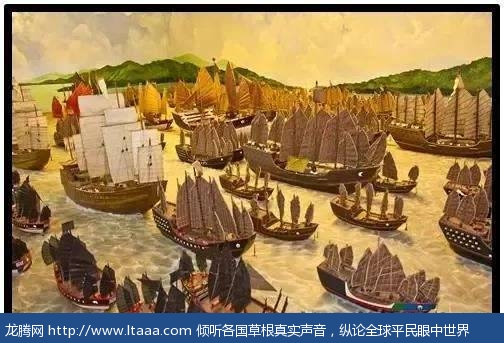Quora:为什么中国没有像欧洲人那样殖民全世界? [美国媒体]
quora网友:这是一个很棒的问题。历史学家一直试图研究为什么中国不愿殖民世界,即使它有资源,人力和技术允许它这么做。实际上,在公元7世纪的唐朝时,中国的造船技术和航海技术可以使它跨越太平洋去“探索”并殖民西半球和澳大利亚/新西兰,如果它想要这么做............
Why didn't China colonise the world like the Europeans?
为什么中国人没有像欧洲人那样殖民全世界?
Feifei Wang, I spend about the same amount of my life in China and in the US.
Because we seriously believed we had everything. Think about the stuff the Spanish and the English people wanted when they sailed off:
因为我们非常相信我们已经拥有了一切。想想西班牙人和英国人起航时想要的东西:
Spices? Had those
香料?有了
Silk? We basically invented it.
丝绸?是我们发明的。
Gold? Plenty!
黄金?太多了!
Silver? Shit load of.
白银?到处都是。
Farm land? Miles and miles and miles…
农场?一望无际……
Large amount of cheap labor? More than enough.
大量的廉价劳动力?供不应求。
Natural resources? Which kind? Never mind… we have them all.
自然资源?哪一种?无所谓……我们都有。
And on the flip side:
另一方面:
Religious oppression? Nope, don’t care about religion. You believe whatever shit you want, just obey our laws and don’t rebel against government.
宗教压迫?不,不关心宗教。你可以相信一切你想相信的,只要遵守我们的法律并且不要造反。
Need land for penal colony? Nope, we execute our prisoners each fall, the rest get to serve in the army.
需要土地作为流放地?不,我们每年秋天处死我们的囚犯,其余的去服兵役。
Land too poor, can’t support local population? Nope. OK, some lands might be poor, there’re definitely bad years, but moving around usually means cross the mountain, not sailing across the ocean.
土地太贫瘠,无法支撑本地人口?不。好吧,一些土地可能是很贫瘠,肯定有荒年,但四处走动通常意味着翻山越岭,而不是渡海跨洋。
Do you know what China did need at the time?
你想知道当时中国需要什么?
Trade. So we sent out a big fleet to discover trade routes, and we brought back shit China didn't have….
贸易。所以我们派出了一支大舰队去探索贸易路线,然后带回了一堆中国没有的狗屎……
Giraffes!
长颈鹿!
Zheng He be like: Your Highness! Just look at it!!! Isn’t it cute? Have you ever seen such thing before?
郑和:陛下!看呐!它不可爱吗?您之前见过这玩意儿吗?
And the Ming emperor be like: Hell No!!! Love this shit! I’m gonna name it 长颈鹿 (long neck deer) because it looks like a deer but has long neck! Totally worth the trip! Here’s more money, go bring back more cute stuff and open some ports so we can trade with them.
大明皇帝:当然不!!朕就喜欢这口味的!朕要把它叫做长颈鹿,因为它长得像鹿却有个长脖子!这一趟太值了!给你更多的钱,去给朕带回更多可爱的东西,然后开放港口,如此便可与外夷通有无了。
We don’t need colonies, we don’t need labors and economic crops to support our dying economy back home.
我们不需要殖民地,我们不需要劳动力和经济作物来支撑我们垂死的经济回到家。
So, we didn’t colonize places.
所以,我们没有殖民地。
回复此楼:
Daryl Tew
50 upvotes
I just realised Giraffe in Chinese literally means long neck deer. Wow my Chinese sucks
我才意识到Giraffe在中文中的字面意思是长颈鹿。噢我的中文太烂了。
Rohan Mehere
295 upvotes
I think this applies to India as well.
It's amazing how these two major civilizations just happen to be next to each other.
我相信这条回复对印度也适用。
这两大文明能如此接近真是太让人吃惊了。
David Ravnsborg
35 upvotes
Didn't the emperor who followed the one who commissioned those fleets end up stopping most naval trade and expeditions, essentially slowing Chinese economic growth and cutting it off from the world? He adopted a very “China first” strategy and wanted to focus on domestic issues… but as a result ended up scrapping one of the most powerful naval merchant fleets in the world and closing China off to technological innovation that was happening in other nation states.
这个皇帝不是听从谏言,终止了船队的海上贸易和探险活动,根本上减缓了中国的经济发展,并使得它与世隔绝吗?他接受了一个十分“中国优先”的战略,希望关注国内问题……但是因此废弃了世界上最强大的海上商船队之一,使得中国无法进行发生在其他国家的技术创新。
Bonan Wang Link
36 upvotes
Completely agree; Giraffes are cute as hell.
完全同意;长颈鹿太可爱了。
Full disclosure: I have a thing for giraffes. I buy my baby all things giraffe or giraffe-patterned. Does he like giraffes? I don't know—He's 2 months old!
坦诚地说:我有很多和长颈鹿有关的东西。我给我的宝宝买了很多长颈鹿的或有长颈鹿图案的东西。他喜欢长颈鹿吗?我不知道——他才两个月!
Bill Lipton, Authored multiple books dealing with Serpent Mythology/Cultures
Answered Sun
Because it was illogical to do so. Look at all the nations that attempted to colonize (seek conquest) over other lands. None have survived as long as China. The only break in Chinese history came when Britain attempted to colonize it.
因为这样做是不合逻辑的。看看所有那些寻求在其他土地上殖民的国家。没有一个像中国存在这么长时间。中国历史上唯一的例外就是英国企图殖民它的时候。
Consider the reasons for colonization — land grab or commerce. The Silk Road, and now the New Silk Road, accomplished the commerce, and China already has enormous amounts of land which they did stretch to natural boundaries.
想想殖民的原因——攫取土地或者贸易。丝绸之路,以及现在的新丝绸之路,都完成了商业贸易,并且中国已经拥有了延伸至其自然边界的大量土地。
World conquest is irrational — especially if you can achieve the same goal through commerce and education, while keeping your population “pure”… having unique cultural traits defined within populations which believe they are part of the bigger whole.
征服世界是不合理的——尤其是如果你能通过贸易和教育达成同一个目标,同时使你的人口保持“纯净”……拥有独特的,人们都认为自己是一个更大整体的一部分的文化特征。
In the USA, it was done with States; in the Bible, via Tribes; in India, via castes; China did the same. But that makes sense. China/India/Hebrew are related groups as was explored in 2011 using DNA & related mythologies as the basis for Grandpa Was A Deity: How a Tribal Assertion Created Modern Culture: William Lawrence Lipton: 0884571331615: Amazon.com: Books
在美国,这通过联邦的形式完成了;在圣经中通过部落;在印度通过种姓;中国也做了相同的事情。但这是有道理的。中国/印度/希伯来人是有关联的民族,这在2011年通过DNA和相关神话,出自: Grandpa Was A Deity: How a Tribal Assertion Created Modern Culture: William Lawrence Lipton: 0884571331615: Amazon.com: Books
Then in 2012, the discoveries in Grandpa Was a Deity were expanded by looking at the huge Patriarch ages in the bible to reveal the calendar was the basis & the patriarchs are effectively chronological eras, with the Calendars of India/China/Rome all linked by same math {Hebrew & Chinese even use the same 19 year cycle and their cultures are based on mercantile combined with scholarship) as shown in the book Genesis of Genesis William Lawrence Lipton: 9781466459564: Amazon.com: Books where we also discover that we are still using the Hebrew Calendar — a critical node having been reset to one, and then adjustments made in the 1500’s yielded our current system and separated it from the tight alignment to the Hebrew.
然后在2012年,通过查阅圣经中的大先祖时代来揭露出历法为基准,以及犹太先祖时代是可信的时代,Grandpa Was a Deity中的发现被推广开来,随着印度/中国/罗马的历法都是以同样的数字联系起来(希伯来和中国甚至使用相同的19年轮回,而且他们的文化都结合了学术和商业)被呈现在Genesis of Genesis这本书中,我们还可以发现我们仍在使用希伯来历法——一个已被重置的重要节点,然后在16世纪做出的调整妥协于我们现有的系统,并将之从准确的排列中分离出来变为希伯来文。
The aforementioned then revealed patterns in human behavior and cultural change which were explored in books not relevant to this QUORA. The key being that mercantile expansion and not cultural takeover are driving forces. In the process, new knowledge is incorporated in the mercantile (hence the necessary link to scholarship and Biblical justification for merchants supporting the scholars in the same way ancient Chinese culture encouraged support of scholars).
上述还揭示了人类行为和文化变迁的模式,这在书中可以浏览到,就不放到QUORA上了。商业扩张而非文化接管是驱动力即是关键。在这个过程中,新的知识在商业行为中被纳入(因此把学术和圣经中所述的商人支持学者的正当理由和古代中国文化同样鼓励支持学者联系起来是很有必要的)。
Look at China today. Note how quickly it became a mercantile giant — after it tossed off the remnants of the colonial occupations which marked the period from the late 1800’s to the late 1900’s. The “cultural revolution” was a repeat of the events of 2300 years ago, when China established the first Emperor and ditched the garbage that had entered its culture.
看看现在的中国。注意它是如何快速成长为一个商业巨人的——在它摒弃了19世纪到20世纪的殖民残余之后。“文化大革命”是2300年前那些事情的重演,当时中国出现了第一个皇帝,随后抛弃了那些已经进入它文化的垃圾。
To be a colonial power is illogical and culturally limiting.
成为一个殖民大国是不合理且为其文化所不容的。
Pablo Djankowicz Ruizinowitz, History major, interested in tid-bits about WWII
Updated Mar 27
This is a great question. Historians are still trying to figure out why China was unwilling to colonize the world since it had the resources, the manpower and the technology to make it happen.
这是一个很棒的问题。历史学家一直试图研究为什么中国不愿殖民世界,即使它有资源,人力和技术允许它这么做。
In fact, China had the shipbuilding and navigational know-how to make it across the Pacific to “discover” and colonize the Western Hemisphere and Australia/New Zealand if it felt like doing that by the time of the Tang Dynasty in the 600s AD.
实际上,在公元7世纪的唐朝时,中国的造船技术和航海技术可以使它跨越太平洋去“探索”并殖民西半球和澳大利亚/新西兰,如果它想要这么做。
During the trade-friendly, sea-faring Northern and Southern Song Dynasties, China had a huge trading fleet that numbered tens of thousands of boats that could ply the South and East China Seas with ease. Overseas trade was so important, in fact, that for the only time in Chinese history the Southern Song Dynasty of the 1100s AD and 1200s AD had its capital on the ocean, in the modern-day port city of Hangzhou. (All Chinese capitals before and since have been deep inland, far away from the coast, like Beijing. Most Chinese dynasties except for the Southern Song deeply distrusted trade and the powerful, rich merchants that trade tends to foster.)
在热衷海洋贸易的两宋时期,中国拥有巨大规模的商船队,名下有数以万计的船只可以熟练地在南中国海和东中国海经营生意。实际上,对这个时期的中国历史来说,海外贸易十分重要,12世纪到13世纪,南宋王朝将它的都城迁往海边,在今天的港口城市杭州。(之前所有的中国都城都深在内地,远离海岸,比如北京、大多数中国王朝,除了南宋,都十分不信任商业和那些往往以经商为生的有实力、富有的商人。)
The below is a model replica of a Southern Song Dynasty ship of the 1100s AD. It was quite impressive, being bigger and more technologically sophisticated than any ship being built in the world at the time. These ships had huge rudders and divided sails that efficiently tacked to the wind, and compare favorably to the Spanish galleons that the Europeans used for their exploration and colonization in the 1500s and 1600s (an example which is below the Southern Song Dynasty ship picture).
下图是12世纪南宋时期船只的一个复制模型,这让人印象深刻,远比当时世界上其他任何在建的船只要大得多且技术先进得多。这些船只有着巨大的船舵和分开的风帆,可以有效地抢风行驶,足以和欧洲人在16-17世纪用于探险殖民的西班牙大帆船相媲美(下图是南宋船只的一个例样)。
China’s seafaring technology reached its apogee during the Ming Dynasty, in the early 1400s, when the Yongle Emperor recruited one of his trusted eunuchs, Zheng He, to sail the “Treasure Fleets” to demonstrate to the world the power and riches of China. The Yongle Emperor was, as far as I can tell, the only Chinese emperor since the Tang Dynasty who seriously considered maritime exploration as a primary tool to expand Chinese influence, and who put huge amounts of resources into making it happen.
中国的航海技术在明代达到了顶峰,在十五世纪初,永乐皇帝招募了一个他信任的太监,郑和,行驶“宝船”,向世界展示中国的力量和财富。据我所知,永乐皇帝是自唐朝以来唯一一位认真考虑海上探险作为扩大中国影响力的主要途径的中国皇帝,他把大量的资源投入到了这件事情中。
These “Treasure Fleets” set out from Nanjing, the Ming Dynasty capital at the time, and went throughout the Indian Ocean, some making it all the way to the East African coast. There were 7 expeditions that took place between 1405 and 1433.
这些“宝船”从当时明朝的都城南京驶出,穿过印度洋,一些船只甚至到达了东非海岸。1405年到1433年一共有七次下西洋的举动。
The below is an example of how sophisticated China’s shipbuilding technology had become. The very big boat was one of the flagships of Zheng He’s “Treasure Fleets”, which sailed from China to Indonesia to India. The much smaller boat was the European flagship that Vasco Da Gama, the Portuguese explorer, used to sail around the Cape of Good Hope at the southern tip of Africa on his way to “discover” India in 1498. That flagship was at the cutting edge of European sailing technology. Just look at how massive the differences were in technological know-how.
下面是说明中国的造船技术已经多么成熟的一个例子。这艘巨大的船是郑和“宝船舰队”的旗舰,从中国航行至印度尼西亚和印度。小一些的船是葡萄牙探险家达伽马在1498年“发现”印度的途中,航行于非洲南端好望角的欧洲旗舰,该旗舰是欧洲帆船技术的前沿。看看技术的差异到底有多大。
Below you can see a whole “Treasure Fleet” decked out, sailing the seas. Each fleet contained hundreds of boats, each boat with hundreds of men. In total, around 20,000 people would be on board one of these fleets, which made a fleet as populous as a contemporary city and the largest armada of its kind in the world at that time. And these fleets sailed for thousands of miles per trip. It was quite impressive. By contrast, Vasco da Gama’s fleet in 1498 contained four tiny ships and at most 170 men.
下面你可以看到一个完整的“宝船舰队”航行在海上的形象。每个舰队都有数以百计的船只,每个船都有数百名男子。一个船队总共有大约20000人,这使得舰队的人口可比拟一个当代城市并使至成为当时世界上最大的同类舰队。这些船队每次旅途都航行数千英里。这是相当令人印象深刻。相比之下,1498年瓦斯科·达·伽马的舰队只有四艘小船和最多170人。
China, as a result, would’ve crushed Europe if it had been competing as a colonizer in the early 1400s.
因此,如果15世纪早期中国要作为一个殖民者来竞争的话,它会粉碎欧洲。
Alas, that was not to happen. China after the Yongle Emperor’s death in 1424 and the last “Treasure Fleet” in 1433 turned in on itself and began to close itself off from the outside world. Subsequent Ming emperors dismantled the great ships of the “Treasure Fleets” and used the huge amounts of money devoted to maritime exploration into building the extremely expensive Great Wall, and into building and maintaining huge armies to ward off the newly powerful Mongols on the northern borders.
唉,那不会发生。1424年永乐皇帝驾崩,1433年“宝船舰队”进行了最后一次航行,之后中国开始转向自我,闭关锁国。后来的明朝皇帝拆除了“宝船舰队”的伟大的船只,并把用于航海探索的经费用来建造极其昂贵的长城,以及建设和维持庞大的军队以抵御在北部边境兴起的强大的蒙古。
It was a bad time for China to cut itself off, as it was during the 1600s and 1700s that Europe began to grow technologically by leaps and bounds. And it was colonization, and the continual competition it fostered among small European kingdoms (small in comparison to China, that is), that caused these technological leaps and bounds.
闭关锁国对中国来说一段糟糕的时期,因为在17世纪和18世纪期间,欧洲开始了技术上的飞跃。殖民和欧洲小国(相比中国确实是)持续的竞争导致了科技的突飞猛进。
It was the centralized nature of the historical Chinese state that led China to not explore, colonize and expand outside its immediate sphere of influence in East Asia.
古代中国政权的集权性,使得中国的统治者不探索、不在东亚的势力圈子之外开拓和扩大影响。
In the 1,400 years after China attained in the Tang Dynasty the technological, logistical and resource capabilities of carrying out long-distance colonization, there was only one period of sustained political division of warring small kingdoms similar to what characterized Europe after the fall of the Roman Empire—the Five Dynasties and Ten Kingdoms period (五代十国), which ended in 979 AD when the Northern Song Dynasty was founded. This period of disunity only lasted around 90 years or so. Otherwise, all emperors who founded dynasties after the Northern Song Dynasty just took control of the previous dynasty’s powers with a rebellion or rebellions. As a result, there were no “warring states” that preceded the Yuan Dynasty, the Ming Dynasty or the Qing Dynasty.
在中国于唐代获得了进行远程殖民的技术、后勤和资源能力之后的1400年间,只有一个割据政权互相攻伐的持续分裂时期,类似于罗马帝国没落之后的欧洲——五代十国,结束于979年北宋王朝的建立(应该是北宋灭掉北汉完成局部统一)。这个分裂时期仅仅持续近90年。此外,北宋之后建国的历代帝王皆是通过造反来夺取前朝的权力。因此,元明清三朝更易都没有出现“战国”。
Because of a highly centralized state, any decision that happened in the imperial court either advanced or stopped projects that could lead to colonization. It’s not a great leap of logic to think that if the Yongle Emperor’s “Treasure Fleets” had continued for another 100 years after 1433, that one or two high court officials or emperors would’ve thought it would’ve been a good idea to take some land—and thus colonies—in exchange for all the money and trouble they were spending on these huge maritime expeditions.
由于高度集权,任何朝廷的决议要么提前,要么阻止殖民的计划。认为永乐皇帝的“宝船”若在1433年之后再持续100年不是异想天开,一两个朝廷高官或者皇帝也许也想过过搞点地盘——然后殖民——作为所有在航海探险中付出的金钱和造成的麻烦的交换会是个好主意。
Unfortunately the Ming court turned very conservative after 1433, concentrating its energies on land-based enemies, mostly the Mongols. The Qing court after 1644 continued with that same land-based foreign policy, very much ignoring what was happening in maritime technology. And both the Ming and the Qing courts remained deeply distrustful of overseas trade, regulating and controlling it with a weird anti-outsider paranoia that kept foreigners and Chinese traders heavily monitored and restrained. It was an almost 180 degree policy turn from the openness, trade-friendliness and cosmopolitanism of the Southern Song.
不幸的是,明朝在1433年后变得非常保守,把精力集中在陆上敌人,主要是蒙古人身上。1644年后的清廷继续坚持同样的陆权外交政策,非常无视海洋技术的发展。无论是明、清朝廷都深深怀疑海外贸易,以奇怪的排外的偏执心来调节和控制海外贸易以让外国人和中国商人处在严格的监视和约束之下。这几乎是对南宋的贸易友好和世界主义180度的政策转向。
The Europeans, because they were so politically divided, did not face the same problem of over-centralization of exploration and colonization decisions as happened in China.
欧洲人,由于他们政治上分裂,没有遇到相同的,发生在中国的,在探索和殖民决议中的过度集权问题。
Christopher Columbus is a great example of this.
克里斯托弗·哥伦布是一个绝佳的例子:
Columbus had this rather crazy idea that if he sailed due west from Europe, that he would eventually hit Asia on the other side. Astronomers and other learned men in various European courts countered that this was impossible since, considering the circumference of the Earth known at that time, he would have to traverse an ocean 15,000 miles wide to get to Asia. Columbus thought not, that the ocean was just a mere 3,000 miles wide and that he would have enough supplies to make it across to Asia. Neither astronomers nor Columbus, of course, knew that a huge continent lay in the way.
哥伦布有这样一个疯狂的想法,如果他从欧洲向西航行,他最终会在另一端碰上亚洲。天文学家和其他博学的人在欧洲的各种场所反驳说,这是不可能的,因为考虑到当时已知的地球周长,他将不得不穿越15000英里的海洋到了亚洲。哥伦布不知道,那海洋只有3000英里宽,他有足够的补给使它能横穿到达亚洲。当然,天文学家和哥伦布都不知道有一块巨大的大陆横在路上。
Columbus, with his new ideas, first went to the King of Portugal to see if he could get the money for his expedition. The King conferred with his experts and advisors and turned Columbus down on precisely the grounds I gave above. After a few years, Columbus went to the King of Portugal again, and again the King turned him down—this time because Portuguese explorers had just rounded Africa and the King needed to conserve his money for expeditions to India. He then went to the courts in Genoa and Venice in Italy—at that time very rich cities capable of giving him the ships and money to sail across the Atlantic. They also turned him down. He sent his brother to the King of England to see if he could sell that court on his expedition idea. The English King turned him down. Columbus was finally down to the Spanish court of Queen Isabella and King Ferdinand. Isabella remained skeptical, but Ferdinand became intrigued. Columbus finally convinced him, he convinced his wife, and off Columbus went in 1492 with the necessary ships and money to cross the Atlantic.
哥伦布带着他的新想法,首先去面见葡萄牙国王,看看他是否可以为他的远征弄到钱。国王与他的专家和顾问协商,然后以我上述的理由拒绝了哥伦布。几年后,哥伦布又去找葡萄牙国王,这次国王又拒绝了他,因为葡萄牙探险家刚刚环行了整个非洲,国王需要把钱花在前往印度的探险队上。随后他前往热那亚和意大利的威尼斯——当时非常富有的城市,可以给他船只和钱去穿越整个大西洋。他们也拒绝了他。他派他的兄弟到英国国王那里去,看他是否能向英国宫廷推销他的探险计划。英国国王拒绝了他。哥伦布最终到达了西班牙宫廷面见女王伊莎贝拉和国王费迪南。伊莎贝拉仍然表示怀疑,但费迪南却很好奇。哥伦布终于说服了他,而他说服了他的妻子,然后于1492年派遣哥伦布,带着必要的船只和资金穿越大西洋。
So Columbus had to be rejected by 5 rich and powerful monarchs before finding one who had enough faith in him to give him the money and ships he needed.
因此,在找到一个对他有足够信心并给予他他所需的金钱和船只的人之前,哥伦布已经被5个富有而强大的君主拒绝了。
And even if he had failed with the Spanish monarchs, Columbus could still appeal to and convince the King of France, the King of Scotland, the various kingdoms and rich city-states in Italy that were not Genoa and Venice, the Pope, the King of Denmark, the Holy Roman Emperor, and the various kingdoms and city-states of Germany. Columbus, in other words, had a lot of choice in finding his “venture capitalist investor” so to speak. His goal was to clinch one sale with one single monarch to be successful.
即使他与西班牙的君主谈判失败,哥伦布仍然能吸引和说服法国国王,苏格兰国王,各个王国和除了热那亚和威尼斯之外的富裕的意大利城邦,还有教皇,丹麦国王,神圣罗马帝国皇帝,以及德意志的各个王国和城邦。换言之,哥伦布在寻找“风险投资家”时有很多选择。他的目标是与一个君主达成一笔买卖,以获得成功。
Imagine doing that in China—a Columbus-like explorer with a crazy exploration idea would only have one court to go to, the Ming court. And if the emperor turned him down, that was it. End of story. There was no other recourse, there was no choice at all.
想象一下在中国这么做——一个像哥伦布一样的探险家带着一个疯狂的探索想法,只有一个地方可去,那就是大明朝廷。如果皇帝拒绝了他,那就只能这样了。故事结束。没有其他的资源,就根本没有选择。
So it was this hyper-centralization of the historical Chinese state that strangled what little appetite there was for exploration and subsequent colonization among the Chinese.
所以正是这种历史上中国的过度集权,扼杀了中国人探索和殖民的小小欲望。
版权声明
我们致力于传递世界各地老百姓最真实、最直接、最详尽的对中国的看法
【版权与免责声明】如发现内容存在版权问题,烦请提供相关信息发邮件,
我们将及时沟通与处理。本站内容除非来源注明五毛网,否则均为网友转载,涉及言论、版权与本站无关。
本文仅代表作者观点,不代表本站立场。
本文来自网络,如有侵权及时联系本网站。
图文文章RECOMMEND
热门文章HOT NEWS
-
1
Why do most people who have a positive view of China have been to ...
- 2
- 3
- 4
- 5
- 6
- 7
- 8
- 9
- 10
推荐文章HOT NEWS
-
1
Why do most people who have a positive view of China have been to ...
- 2
- 3
- 4
- 5
- 6
- 7
- 8
- 9
- 10
